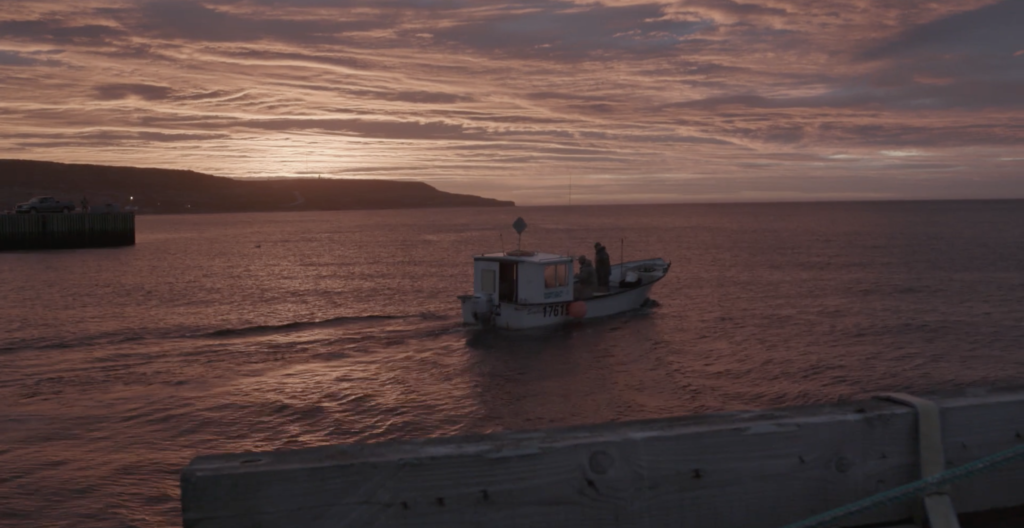Aude Leroux-Lévesque is a Montreal-based documentary filmmaker. Her first documentary, “Call me Salma,” aired on Arte, EBS Korea, Direct 8, and played in numerous international film festivals. Her second documentary, “Living with Giants,” won the 2016 Emerging Canadian Filmmaker at Hot Docs, Best Canadian Documentary at VIFF, and was nominated for three Prix Iris, including Best Feature Documentary Film.
“A Place of Tide and Time” will premiere at the 2019 Hot Docs Canadian International Documentary Festival on April 28. The film is co-directed by Sébastien Rist.
W&H: Describe the film for us in your own words.
AL: A Place of Tide and Time” is a documentary that was shot in a small, remote fishing village in Atlantic Canada. The story is a conversation between the young and the old, who don’t necessarily agree on what the future holds for their village.
The youth are leaving, searching for better opportunities elsewhere, while the older generation tries to hold on to their past and traditions.
W&H: What drew you to this story?
AL: My father grew up not too far from the village of St. Paul’s River, where most of the film was shot. When he turned 17, he bought a motorcycle and left, aspiring for higher education and a job that could not be found there. He never returned.
When my co-director Sébastien Rist and I were invited to teach video workshops in these coastal villages five years ago, I connected with the region and immediately recognized my father’s story in all the teenagers that were leaving to attend colleges in bigger cities. It was at that point that we knew we had to go back and make a film about that.
W&H: What do you want people to think about when they are leaving the theater?
AL: I hope the film makes people think about how our identity is deeply rooted in the place we’re from. I also hope the film makes people slow down, take a deep breath, and appreciate the beauty our country has to offer—appreciate the snow storms that close down roads for days, the cold wind that makes our hair messy, the tides that endlessly carry sea life onto the shore, and the fragile flowers that emerge in the spring.
W&H: What was the biggest challenge in making the film?
AL: Getting to the Lower North Shore is an event in itself. It’s a multiple-day drive across different provinces via ferries or a full day of flights in tiny planes.
However, the most challenging was probably convincing people — and ourselves, to be honest — that amidst the apparent emptiness of a place where nothing really happens, there was a great story to be told.
W&H: How did you get your film funded? Share some insights into how you got the film made.
AL: The film was first funded with Quebec government grants in research and development. Once we came back with a demo, we were able to secure a TV license and more government funding. We also benefited from the Canadian tax credits programs.
W&H: What inspired you to become a filmmaker?
AL: Ever since I can remember, I wanted to make a positive impact around me and in society. Documentary filmmaking came as a clear way towards trying to achieve this, while allowing me to experiment with creativity on so many levels.
W&H: What’s the best and worst advice you’ve received?
AL: The worst advice someone ever gave me was to look for a better-paying job. I’m glad I never even considered taking this advice seriously.
On the other hand, other people told me not to wait for the money and just follow a great story when it presents itself. This has proven to be an extremely smart thing to do.
W&H: What advice do you have for other female directors?
AL: Despite the challenges that we face, don’t think of yourself as a female director — just think of yourself as a director.
W&H: Name your favorite woman-directed film and why.
AL: I would love to namedrop all my colleagues—female documentary film directors in Quebec. But since I have to choose, I’d say that you have to check out Zayne Akyol’s work, such as her praised “Gulistan, Land of Roses.”
W&H: It’s been a little over a year since the reckoning in Hollywood and the global film industry began. What differences have you noticed since the #MeToo and #TimesUp movements launched?
AL: I’ve noticed more grants and programs dedicated to women. Until we get as much representation and opportunities as men, I think this is a great thing. But I hope we won’t need such programs in the near future.







